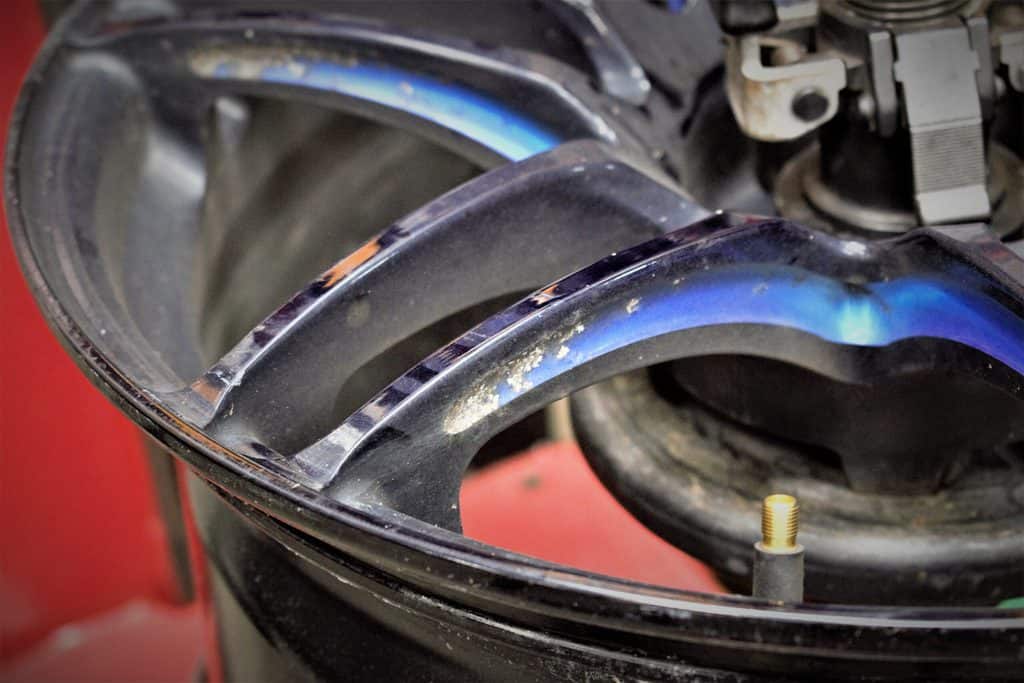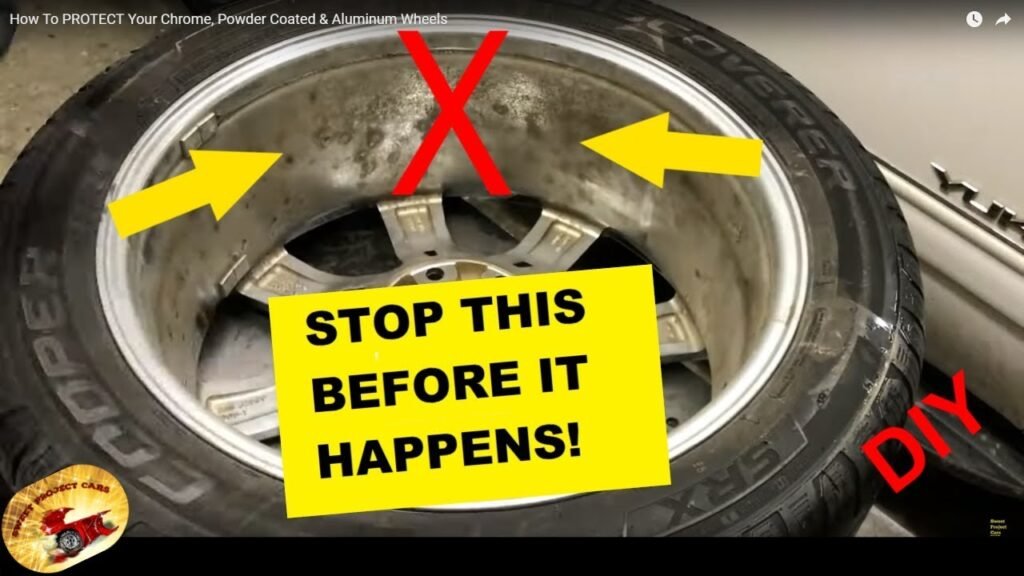To protect wheels from corrosion, regularly clean them and apply a protective coating. Keep wheels dry and store them properly.
Wheels are crucial for your vehicle’s performance and appearance. Corrosion can severely damage them, leading to costly repairs. Regular maintenance is essential to keep wheels in top condition. Cleaning removes harmful elements like dirt and salt. Applying a protective coating, such as wax or sealant, adds a layer of defense against moisture and chemicals.
Storing your vehicle in a dry, sheltered area can also prevent corrosion. Prioritizing these steps will prolong the life of your wheels and ensure they remain functional and visually appealing. Investing time in proper care now can save you from expensive fixes in the future.
Causes Of Wheel Corrosion
Understanding the causes of wheel corrosion is crucial for maintaining your vehicle’s performance and aesthetics. Corrosion can weaken the wheels, leading to safety hazards and costly repairs. By identifying the factors that contribute to corrosion, you can take steps to protect your wheels and extend their lifespan.
Common Factors
Several common factors contribute to wheel corrosion. First, exposure to moisture and water can cause rust to form. Second, road salts used during winter months are highly corrosive. These salts can cling to the wheels and accelerate corrosion. Third, acidic substances like bird droppings or tree sap can damage the wheel’s protective coating.
Environmental Impact
The environment plays a significant role in wheel corrosion. Areas with high humidity levels are more prone to corrosion. The moisture in the air can settle on the wheels, leading to rust. Coastal regions are particularly at risk due to salty air. Salt is a known catalyst for corrosion and can quickly deteriorate metal surfaces.
| Factor | Impact |
|---|---|
| Moisture | This leads to rust formation |
| Road Salts | Accelerates corrosion |
| Acidic Substances | Damages protective coating |
| High Humidity | Increases moisture exposure |
| Salty Air | Promotes rapid corrosion |
Recognizing these environmental impacts is essential for proactive maintenance. Regular cleaning and protective coatings can significantly reduce the risk of corrosion. Use anti-corrosion sprays and wash your wheels frequently, especially after exposure to harmful elements.
Choosing The Right Materials
Protecting your wheels from corrosion starts with picking the right materials. Different materials offer varying levels of protection and durability. Here, we will compare alloy and steel wheels and discuss the importance of protective coatings.
Alloy Vs. Steel
Alloy wheels are made from a mix of metals. They are usually lighter and offer better performance. Steel wheels, on the other hand, are heavier but more affordable. Each type has its pros and cons for corrosion protection.
| Material | Pros | Cons |
|---|---|---|
| Alloy |
|
|
| Steel |
|
|
Protective Coatings
Applying a protective coating is essential for preventing corrosion. These coatings act as a barrier between the wheel and corrosive elements. Here are some popular types of coatings:
- Powder Coating: Durable and provides excellent protection.
- Clear Coat: Adds a protective layer without changing the wheel’s appearance.
- Paint: Offers both protection and aesthetic appeal.
Each type of coating offers unique benefits. Choose one based on your needs and the conditions your wheels face.
Regular Cleaning Techniques
Keeping your wheels clean is essential for preventing corrosion. Regular cleaning ensures that dirt, salt, and grime don’t cause damage. Let’s explore effective cleaning methods to keep your wheels shining and corrosion-free.
Cleaning Products
Choosing the right products is crucial for protecting your wheels. Here are some recommended items:
- Wheel Cleaner: Use a pH-balanced wheel cleaner for best results.
- Soft Brush: A soft-bristled brush prevents scratches.
- Microfiber Towels: These help in drying without leaving lint.
- Water Hose: A steady stream of water removes loose dirt.
Step-by-step Guide
Follow this simple guide to clean your wheels effectively:
- Rinse the Wheels: Use a water hose to rinse off loose dirt.
- Apply Wheel Cleaner: Spray the cleaner evenly on the wheels.
- Scrub Gently: Use a soft brush to scrub the wheel surface.
- Rinse Again: Rinse off the cleaner with water.
- Dry the Wheels: Use microfiber towels to dry the wheels completely.
Regular cleaning is a simple yet effective way to protect your wheels from corrosion. Use the right products and follow the step-by-step guide to ensure your wheels remain in top condition.
Applying Protective Coatings
Protecting your wheels from corrosion is crucial. One effective method is applying protective coatings. These coatings form a barrier against moisture and road salt. This section will guide you through the types of coatings and the application process.
Types Of Coatings
There are several types of protective coatings for wheels. Each type has its benefits:
| Type | Benefits |
|---|---|
| Powder Coating | Durable, long-lasting, and resistant to chips and scratches |
| Clear Coat | Easy to apply, provides a glossy finish |
| Ceramic Coating | High heat resistance, repels water and dirt |
Application Process
Applying protective coatings requires precision. Here’s a step-by-step guide:
- Clean the Wheels: Use soap and water to remove dirt and grime.
- Dry the Wheels: Ensure the wheels are completely dry before starting.
- Apply the Coating: Follow the manufacturer’s instructions for the coating type.
- Allow to Cure: Let the coating dry and cure as per instructions.
Follow these steps to protect your wheels from corrosion effectively.
Seasonal Maintenance Tips
Keeping your wheels free from corrosion requires seasonal maintenance. Different seasons demand specific care routines. Here are some essential seasonal maintenance tips to protect your wheels from corrosion.
Winter Care
Winter can be harsh on your wheels. Snow, ice, and road salt can cause significant damage. Follow these tips to protect your wheels during winter:
- Clean regularly: Wash your wheels every two weeks.
- Use a mild cleaner: Avoid harsh chemicals that can damage the wheel finish.
- Apply a protective coating: Use a wheel sealant to add a layer of protection.
- Inspect frequently: Look for signs of corrosion and address them promptly.
Summer Care
Summer heat can also affect your wheels. High temperatures and road debris can lead to corrosion. Here are some tips for summer maintenance:
- Wash regularly: Clean your wheels weekly to remove dirt and grime.
- Check for damage: Inspect for scratches and chips that can lead to corrosion.
- Use a wheel cleaner: Choose a product designed for your wheel type.
- Apply wax: Use a high-quality wax to protect the wheel surface.

Credit: avalonking.com
Diy Vs. Professional Services
Protecting your wheels from corrosion is crucial. You can either do it yourself (DIY) or hire professional services. Each method has its own set of advantages and disadvantages. Let’s explore them to help you make an informed decision.
Pros And Cons
DIY: Doing it yourself can be fun and rewarding. You have full control over the process and can choose the materials. But, it requires time, effort, and some expertise.
- Pros:
- Lower cost
- Full control
- Learn new skills
- Cons:
- Time-consuming
- Requires tools
- Risk of mistakes
Professional Services: Hiring professionals ensures high-quality results. They have the expertise and tools needed. But, it can be more expensive.
- Pros:
- Expert knowledge
- Quality materials
- Time-saving
- Cons:
- Higher cost
- Less control
- Dependency on schedules
Cost Considerations
Cost is a crucial factor. Below is a table comparing the costs of DIY and Professional Services.
| Aspect | DIY | Professional Services |
|---|---|---|
| Materials | $50 – $100 | Included in Service |
| Tools | $30 – $200 | Included in Service |
| Labor | Free (Your Time) | $100 – $300 |
| Total Cost | $80 – $300 | $200 – $600 |
The DIY approach is generally cheaper. But remember, it requires your time and effort. Professional services provide convenience and expertise but come at a higher cost.
Common Mistakes To Avoid
Protecting your wheels from corrosion is important. Avoiding common mistakes can keep your wheels shiny and strong. Let’s look at some common mistakes to avoid.
Improper Cleaning
Improper cleaning can damage your wheels. Always use the right cleaners.
- Avoid using harsh chemicals. They can eat away at the wheel’s surface.
- Use a soft brush. Hard brushes can scratch the wheel.
- Rinse the wheels with water. This removes dirt and grime.
Improper cleaning can lead to corrosion. Cleaning properly keeps wheels safe.
Neglecting Maintenance
Neglecting maintenance can cause big problems. Regular checks are important.
- Check for rust spots. Treat them quickly.
- Apply a protective coating. This prevents corrosion.
- Keep wheels dry. Moisture can lead to rust.
Regular maintenance keeps wheels in good shape. Never skip these steps.
| Common Mistake | How to Avoid |
|---|---|
| Using harsh chemicals | Use mild cleaners |
| Skipping regular checks | Inspect wheels monthly |
| Using hard brushes | Use soft brushes |
Avoid these mistakes to protect your wheels. Proper care ensures long-lasting wheels.

Credit: rimscarnated.com
Additional Protection Measures
Wheels are exposed to harsh elements. To protect them, consider additional protection measures. These methods help prevent corrosion and extend wheel life.
Wheel Covers
Wheel covers act as shields for your wheels. They block dirt, salt, and moisture. This reduces the chances of corrosion. Wheel covers come in various materials and designs. Choose the ones that fit your car model. Installing them is simple and quick. Here are some benefits of using wheel covers:
- Prevent dirt buildup
- Block road salt
- Reduce moisture exposure
- Enhance wheel appearance
Wheel covers are a cost-effective way to protect wheels. They also add a stylish look to your car.
Anti-corrosion Sprays
Anti-corrosion sprays create a protective layer on your wheels. They are easy to apply and very effective. These sprays prevent rust and corrosion. You can use them on steel, aluminum, and alloy wheels. Here is a simple application process:
- Clean the wheels thoroughly
- Dry the wheels completely
- Spray a thin, even coat
- Allow it to dry
Anti-corrosion sprays offer long-lasting protection. They are a great addition to your wheel care routine.
| Feature | Wheel Covers | Anti-Corrosion Sprays |
|---|---|---|
| Protection Level | High | Moderate to High |
| Ease of Use | Easy | Easy |
| Cost | Low to Moderate | Low |
| Appearance Improvement | High | None |
Both methods are useful for protecting wheels. Choose the one that suits your needs best.
Frequently Asked Questions
What Causes Wheel Corrosion?
Exposure to moisture, road salt, and brake dust causes wheel corrosion.
How To Clean Corroded Wheels?
Use a wheel cleaner and a soft brush to clean corroded wheels.
Can Wax Protect Wheels From Corrosion?
Yes, applying wax creates a protective barrier against moisture and contaminants.
Are Alloy Wheels Prone To Corrosion?
Alloy wheels can corrode, especially if the protective coating is damaged.
How Often Should Wheels Be Cleaned?
Clean wheels every two weeks to prevent buildup of corrosive materials.
Does Wheel Coating Prevent Corrosion?
Yes, wheel coatings provide an extra layer of protection against corrosion.
Conclusion
Protecting your wheels from corrosion ensures they look great and last longer. Regular cleaning, applying sealants, and avoiding harsh chemicals can help. Follow these tips to maintain your wheels’ pristine condition. Investing time in proper care now will save you money and trouble in the future.
Keep your wheels shining and corrosion-free!


